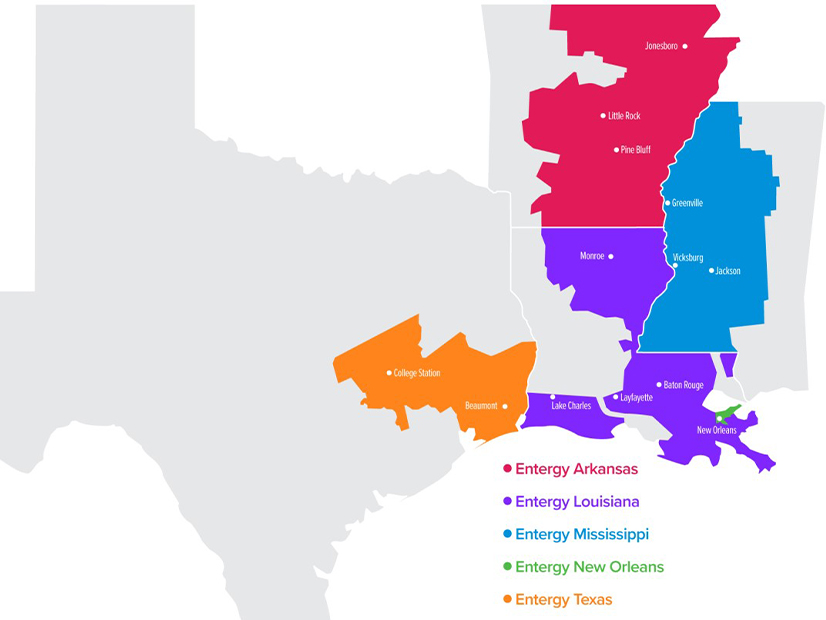FERC has approved a settlement between Entergy and SERC Reliability carrying a $141,000 penalty for violating NERC reliability standards, the commission said this week.
NERC filed the settlement with the commission Sept. 30 in its monthly spreadsheet notice of penalty (NP24-13). It was the only settlement the ERO filed publicly for the month, though NERC also filed a separate, nonpublic spreadsheet NOP involving violations of the Critical Infrastructure Protection standards. Information on CIP violations is not typically disclosed to the public for security reasons.
FERC said in an Oct. 30 filing that it would not further review the agreement, leaving the penalty intact.
Entergy’s settlement with SERC stemmed from a violation of PRC-005-6 (Protection system, automatic reclosing and sudden pressure relaying maintenance). The utility self-reported the infringement to the regional entity June 2, 2022.
While performing scheduled relay maintenance at the Hot Springs substation in Arkansas, Entergy workers discovered that scheduled maintenance and testing activities had not been performed on four panels at the substation. An investigation determined the panels had been “inadvertently suspended in the substation work management system (SWMS)” during the installation of a new high-voltage line relay panel.
The scheduled maintenance and testing had last been performed in 2013 and should have been repeated no later than Dec. 31, 2019. After Entergy discovered the oversight, it completed the testing April 9, 2022.
Following the detection of this infringement, Entergy performed an extent of condition review and in February 2023 found 208 additional relay panels that had been suspended under similar circumstances to the Hot Springs panels. Of these, two panels at the Mabelvale substation still were suspended in the SWMS and were five years overdue for scheduled maintenance and testing, despite remaining in service. The utility performed the required service by April 13, 2023.
In a third instance, Entergy was reviewing a list of potentially overdue work in September 2022 and found that “it failed to complete an … impedance test” on a battery at the Pintail 138-kV substation that should have been done by the previous month. The utility had scheduled the test for March 2022, but rescheduled it several times; by the time it completed the test Sept. 13, 2022, it had exceeded NERC’s mandate of 18 months between tests.
Entergy’s final instance of noncompliance was discovered in August 2023, when the utility’s area planner realized required maintenance on two panels at the Independence substation was past due. Upon review, the utility determined the panels had been mistakenly designated as “N/A” (not applicable) in regard to PRC-005-6. An additional incorrectly designated panel was found at the Little Rock Gaines substation. Maintenance and testing at both substations’ overdue panels were completed by Dec. 14, 2023.
SERC identified the causes of the violation as “ineffective communication, ineffective internal controls, deficient process [and] procedure, and ineffective training program.” The RE said the noncompliance constituted a “moderate risk” to grid stability, noting that the failure to complete required maintenance and testing activities “could result in protective system failures and misoperations impacting a [large] portion of the transmission system.”
Entergy’s mitigation plans included completing the missing maintenance and testing at all affected panels, developing a SERC critical functions checklist for planners and schedulers, updating the work management process for transmission lines and substations, and establishing metrics to show “how many SERC tasks have gone past the Entergy target date.” SERC noted that the utility reported mitigation activities were completed July 25, 2024, although the RE had not yet verified completion at the time of filing.
When determining the penalty, SERC “considered Entergy’s PRC-005 compliance history to be an aggravating factor.” The RE observed that Entergy has five prior relevant instances of noncompliance, four of which involved similar causes and mitigations that SERC suggested could have helped prevent the most recent instances. Mitigating credit was applied for Entergy’s cooperation throughout the investigation, its self-reporting of the violations in a timely manner, its acceptance of responsibility and its agreement to settle the matter.




